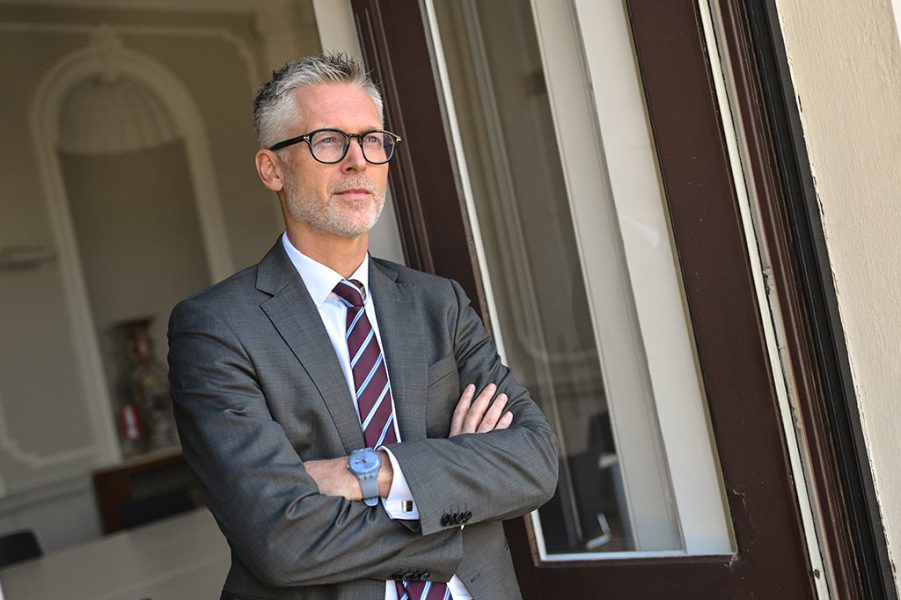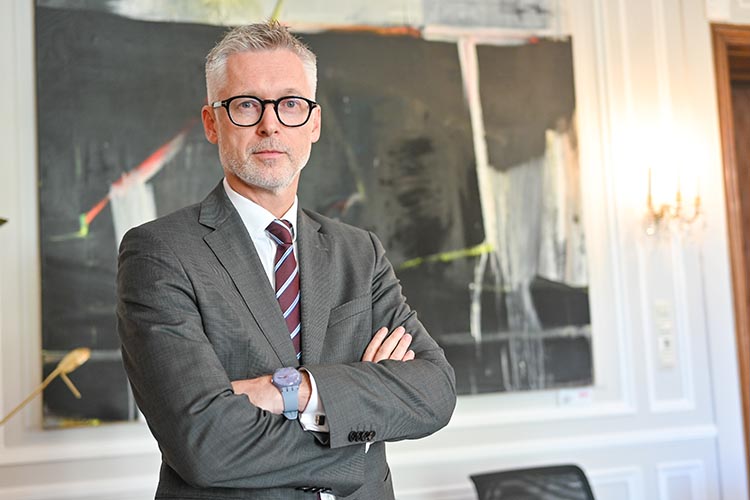The EU accession process requires credible reforms in the area of the rule of law and fundamental freedoms, including the fight against corruption, ensuring the safety of journalists and media freedom. Progress on these so-called fundamental issues, as covered by EU Accession Negotiation Chapters 23 and 24, are crucial to each EU member state assessing whether or not to agree on the opening of new negotiation clusters. The pace of reform in Serbia is primarily in the hands of the Serbian government ~ Christian Ebner
Austria remains committed to supporting the EU accession process of Serbia and the entire Western Balkan region, says Ambassador Christian Ebner in this interview for CorD Magazine, before reminding us of the recent initiative of Austrian Foreign Minister Alexander Schallenberg to form a support group for EU enlargement to encompass the region, which “calls for an accelerated integration of Western Balkan states, with concrete implementation steps, especially through closer involvement in European policymaking and forums even before full membership”. Ebner also notes that Austria and Serbia, together with Hungary, are collaborating intensively in an effort to combat illegal migration across the region.
Your Excellency, this summer saw the staging of the third trilateral meeting between Austria, Hungary and Serbia, which was dedicated to discussing the topic of the joint fight against illegal migration. From the perspective of Vienna, how big a problem is this issue today?
— Illegal migration remains one of the biggest challenges for Austria, as well as for the European Union as a whole. Our trilateral cooperation has already yielded some success. However, Austria is still impacted by illegal migration via the routes that traverse the Western Balkans. Our close cooperation therefore needs to continue. The steps agreed in Belgrade in November 2022 and in Vienna last July are heading in the right direction, as the migration challenge can’t be addressed by any country acting alone. We appreciate the good cooperation we have with Serbia in the area of border management, and also with regard to the ongoing harmonisation of Serbia’s visa regime with the EU acquis. As a direct consequence, in Austria we have observed significant decreases in asylum applications from certain countries.
The meeting in Vienna also saw the President of Serbia reiterate his insistence that Serbia will not be a “parking lot for migrants”. There has been plenty of public speculation in Serbia about such a scenario, according to which EU member states, and Austria in particular, provide Serbia with financial support in return for Belgrade permanently taking care of a larger number of migrants. Does such an agreement exist; and how was Aleksandar Vučić’s statement viewed in Vienna?
— I don’t know anyone who wants to have “parking lots for migrants”. And avoiding precisely that is the objective of humane and effective cooperation between the European Union and its Member States and other countries impacted by the challenge of illegal migration.
The requirements for Serbia’s EU membership are very clear, which means that the successful conclusion of the 35 negotiation chapters needs to be fulfilled prior to accession
The EU is contributing with increasing resources and funds to Serbia in the field of migration and border management, with the aim of having a lasting effect in view of the EU accession process. It has to be noted that an EU-Serbia Readmission Agreement has also been in force since 2008 and sets out clear obligations and procedures for the respective authorities in terms of when and how to readmit people who reside irregularly.
You serve as ambassador to a country that has enjoyed a high level of economic cooperation with Austria for decades; where Austrian companies have a particularly strong presence in the banking and insurance sectors. Given the experiences of the approximately 400 Austrian companies operating in Serbia, what would you say generally about the conditions they’ve faced in doing business in Serbia? What are the greatest challenges confronting them and where is there room for improvement?
—Let me start by pointing out that, according to the latest statistics, there are even more Austrian companies, namely 800. Most of them have been in Serbia for a long time and pursue a long-term strategy. Austrian investors remained in Serbia throughout the pandemic and are well received overall.

In general, the overall investment climate is defined, among other things, by legal security. Adherence to the rule of law and streamlined bureaucracy are of utmost importance to every investor. Serbia has implemented many reforms in that regard, but can still do more in order to become even more attractive.
Does the energy domain represent a new opportunity to improve bilateral cooperation; and which segments of the so-called green transition in Serbia are attracting the most interest among Austrian companies?
— Austria has an excellent reputation for its innovative companies dealing with renewable energies – from hydropower and wind energy, to solar, geothermal and biomass energy. Companies are often niche world champions and offer tailormade, individualised solutions. Programmes aimed at higher levels of energy efficiency are also important.
We appreciate the good cooperation we have with Serbia in the area of border management, and also with regard to the ongoing harmonisation of Serbia’s visa regime with the EU acquis
Serbia has significant coal and hydroelectric power plants, as well as the potential for renewables like wind and solar power. The government is exerting efforts to liberalise the energy market and attract foreign investors. I definitely see potential in that area.
Austria is among the EU member states that support EU enlargement to encompass the Western Balkans. However, no major progress has been made on this front for more than a decade. Considering your own notable experience, would you expect the EU to first expand to the Balkans or to Ukraine and Moldova?
— Austria remains committed to Serbia and the Western Balkan region in their EU accession process. In June, Austrian Foreign Minister Alexander Schallenberg initiated the “Friends of the Western Balkans” group, with the aim of decisively advancing the enlargement process in Southeast Europe.
This group calls for an accelerated integration of Western Balkan states with concrete implementation steps, especially through closer involvement in European policymaking and forums even before the granting of full membership.

The enlargement process as such, however, is not a one-way street and requires a clear and unequivocal commitment of the countries of the region to adhere to the values, rules and standards on which the European Union is founded. Membership candidate countries need to undertake and implement EU reforms. The more tangible and credible the improvements, the faster the accession process will advance. And the impact of the reforms will be felt by Serbia and its citizens even before accession – provided Serbia stays on the right track to EU membership.
You’ve insisted in your statements to the media that Serbia must satisfy the conditions if it is to progress towards membership. In which areas does Serbia have to demonstrate greater progress in order for new accession negotiation chapters to be opened, after a break of two years?
— The EU accession process requires credible reforms in the area of the rule of law and fundamental freedoms, including the fight against corruption, ensuring the safety of journalists and media freedom. Progress on these so-called fundamental issues, as covered by Chapters 23 and 24, are crucial for each EU Member State to assess whether or not to agree to the opening of new negotiation clusters.
I don’t know anyone who wants to have “parking lots for migrants”. And avoiding precisely that is the objective of humane and effective cooperation between the EU and its Member States and other countries impacted by the challenge of illegal migration
The pace of reforms in Serbia is primarily in the hands of the Serbian government. The reform process is the main driver of the pace of accession negotiations. Equally, as a candidate country, Serbia must not leave any doubt over whether it shares the values of the European Union when it comes to the full rejection of Russia’s military aggression against Ukraine.
Is recognising the independence of Kosovo a precondition of Serbia’s membership in the EU?
— The requirements for Serbia’s EU membership are very clear, which means that the successful conclusion of the 35 negotiation chapters needs to be fulfilled prior to accession. This also entails the normalisation of relations between Serbia and Kosovo. The latest developments showed once more how important the dialogue between Belgrade and Pristina is in order to build trust and normalise relations for the benefit of the people. If both sides were to agree on a comprehensive and legally binding agreement on the normalisation of relations, this would certainly set free a lot of political energy for reforms in other sectors and for the negotiating of all open chapters.
| REFORMS The impact of the reforms will be felt by Serbia and its citizens even before accession – provided Serbia stays on the right track to EU membership | INVESTMENTS According to the latest statistics, there are even more Austrian companies, namely 800 | ENLARGEMENT The enlargement process requires a clear and unequivocal commitment of the countries of the region to adhere to the values, rules and standards on which the EU is founded |
|---|